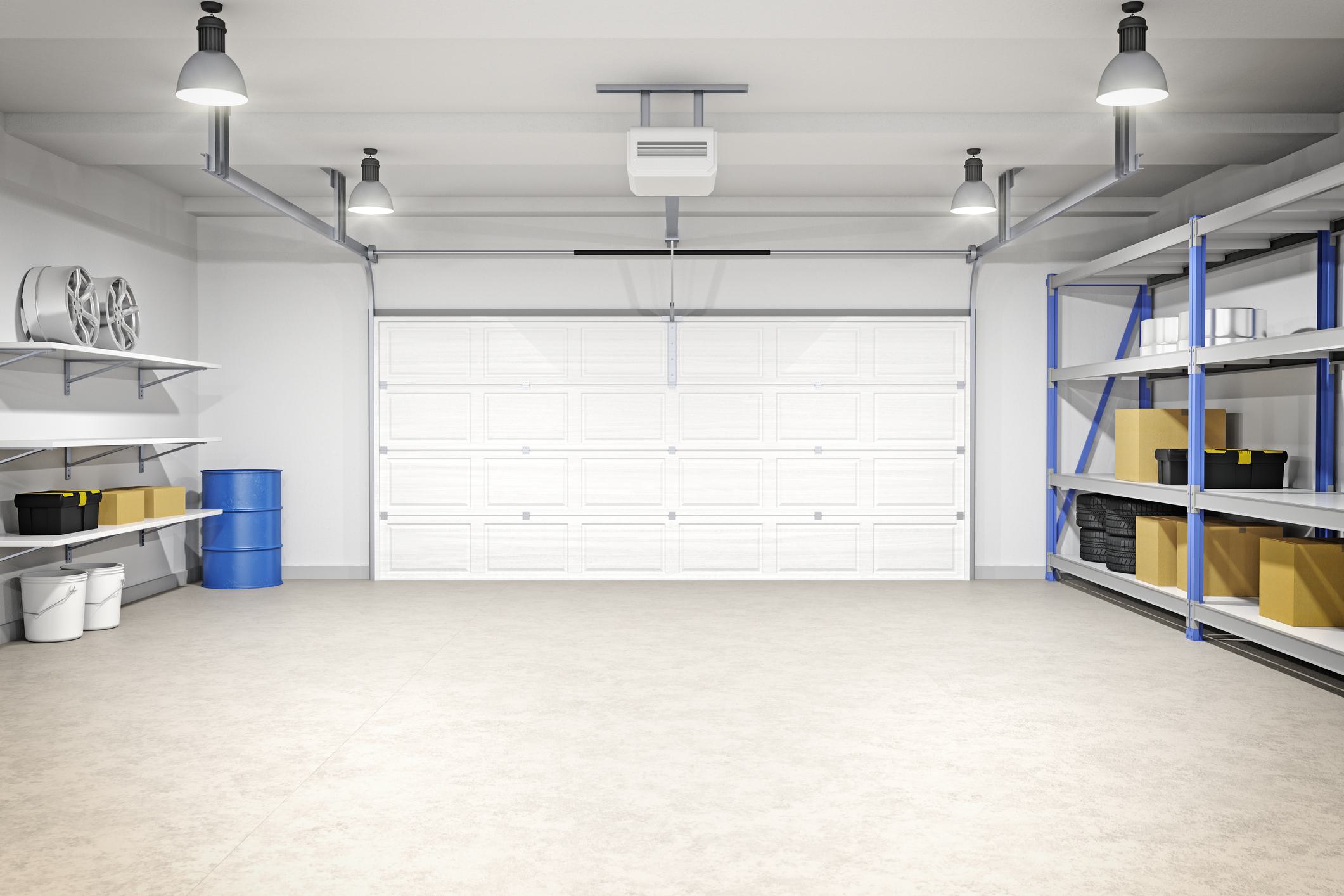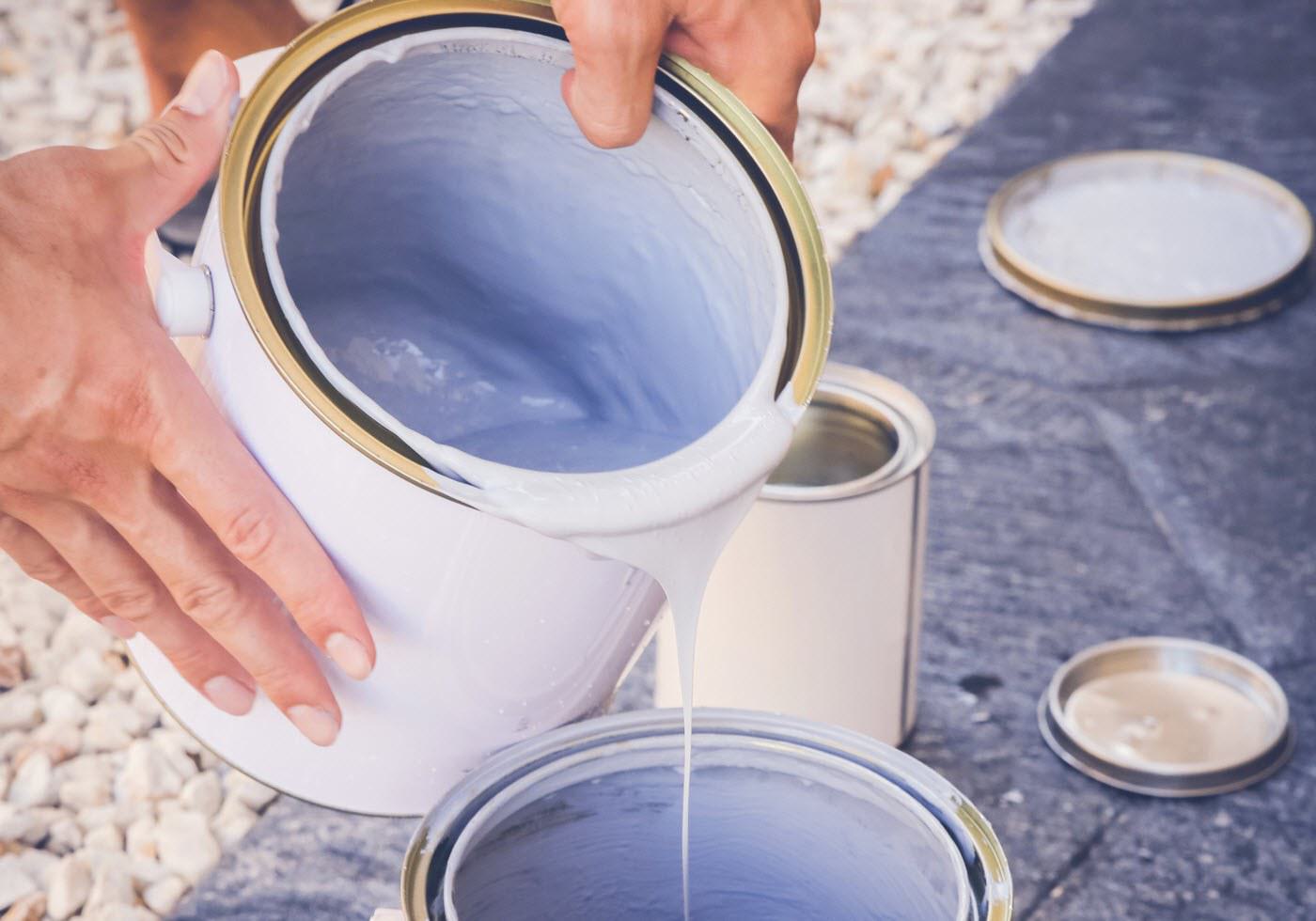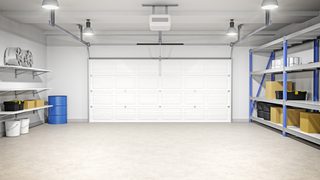Popular Garage Flooring: Pros & Cons
Is it time to redo the floor in your garage? If it’s cracked, crumbling, stained or all of the above, then it’s probably ready for a refresh. In this article, the team at Creative Door™ discusses the pros and cons of seven of the most popular types of flooring for garages.

1. Concrete paint
Concrete or masonry paint is a specialty paint with binders that contract and expand with the concrete surface.
- Pros
A layer of concrete paint is one of the most affordable ways to boost the appearance of your garage floor. It also adds a layer of protection against spills and scratches. You can stay classic with a slate gray or opt for something bolder like a blue or white.
- Cons
Concrete paint will eventually peel and is susceptible to scratching and chipping. Road salt and harsh chemicals, in particular, can wear away at the paint. So plan for occasional touch-ups or repainting.
Paint only provides limited protection but can be used in combination with a sealer.
2. Concrete Stain
When applied to concrete, a concrete stain chemically reacts with the surface to change its colour.
- Pros
Unlike paint, there’s no risk of a stain fading, chipping, or peeling. Moreover, it doesn’t hide the features of the concrete, resulting in a more distinctive look. There are a variety of earth tone colour options available.
- Cons
A stain is a purely aesthetic coating that doesn’t help protect the floor. However, it can be used in combination with other coatings such as urethane to protect the floor against spills and abrasions. Also, note that if your concrete floor has imperfections, a stain can call attention to them. Stained floors also require more upkeep than painted floors.
3. Urethane coating
Urethane is a sealer that protects concrete, stone, and wood with a flexible, non-toxic coating. The term is used interchangeably with “polyurethane” when talking about floor sealers.
- Pros
A urethane floor coating produces a smooth, shiny surface that has a lot of aesthetic appeal. Its elasticity helps to make it resilient and long-lasting, even in cold regions and areas in which temperatures fluctuate. It’s highly impact-resistant and can withstand chemical spills.
- Cons
Urethane is more prone to scratches than other flooring options. And it’s important to note that it doesn’t bond to concrete as effectively as other products. It’s best to apply it over top of a layer of epoxy.

4. Epoxy coating
One of the most popular flooring solutions is an epoxy coating, which is essentially hard plastic.
- Pros
Durable and long-lasting, epoxy coatings are resilient and endure the weight of cars and foot traffic as well as weather fluctuations. It’s scratch-resistant, spill-resistant, and easy to clean.
- Cons
Epoxy tends to be a more expensive option than a sealant, stain, or paint. It also requires more intensive preparation and can take more than a week to apply. Finally, it can present a safety risk, as it’s slippery when wet.
5. Garage floor rolls
Garage floor rolls are usually made of vinyl or rubber and are custom-ordered to fit the size of your garage.
- Pros
Garage floor rolls are the easiest type of flooring to install, as they don’t even require an adhesive. If the fit isn’t perfect, you can trim the roll with a utility knife. Garage floor rolls are easy to clean and are designed to handle the weight of a vehicle. This option also allows you to preserve your original garage flooring.
- Cons
Rubber and vinyl surfaces can be slippery when wet and are susceptible to shrinkage, cuts, and gouges. Many products are only guaranteed for about five years.
6. Interlocking plastic tiles
Like garage floor rolls, interlocking plastic tiles are made to order.
- Pros
Rigid snap tiles are easy to install, can withstand heavy loads, and require little maintenance. There are a variety of finishes available, including perforated tiles to drain spills and snowmelt, as well as multiple colour options
- Cons
Although plastic tiles are less maintenance, they're a more expensive flooring option than epoxy, paint, or staining.
7. Interlocking vinyl tiles
Vinyl (or VCT) tiles provide a softer, more elastic surface than plastic tiles. They’re attached to the floor with an adhesive.
- Pros
Low cost and durable, vinyl tiles are popular for use inside the home. However, they're also a great choice for converted garages. They offer an attractive look and smooth finish and are available in a variety of colours.
- Cons
These tiles are best suited for heated garages or locations with milder temperatures, as extreme cold may affect the adhesive that secures the tiles to the floor. The seams aren’t watertight, so fluids can seep under the tiles. And as they’re fixed in place, this can make cleaning up spills a challenge.
Does Your Garage Door Also Need An Upgrade?
Choose a high-quality garage door that will protect and complement your new flooring. The experienced team at Creative Door™ can help you find the right garage door for you. Contact us to learn more about our products and installation services or visit one of our eight branches in Western Canada.
Request Quote
Starting a new project? Get a free quote on a custom door solution within 24 hours.
Service request
From installation to maintenance and repairs to parts, our team can tackle it all. To request a service, please fill out the details below, and we’ll get back to you within one to two business days.

